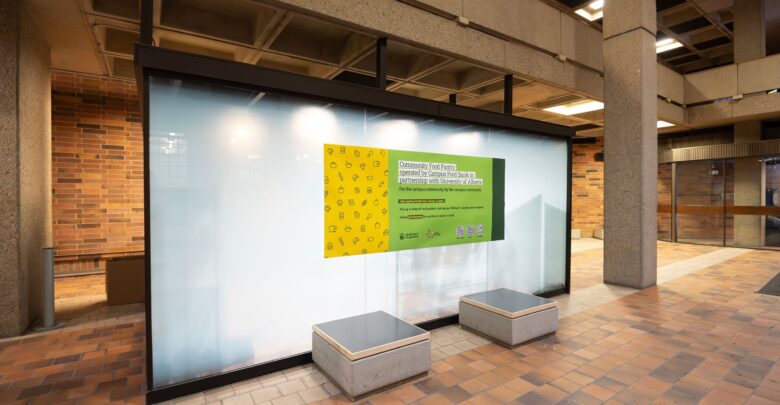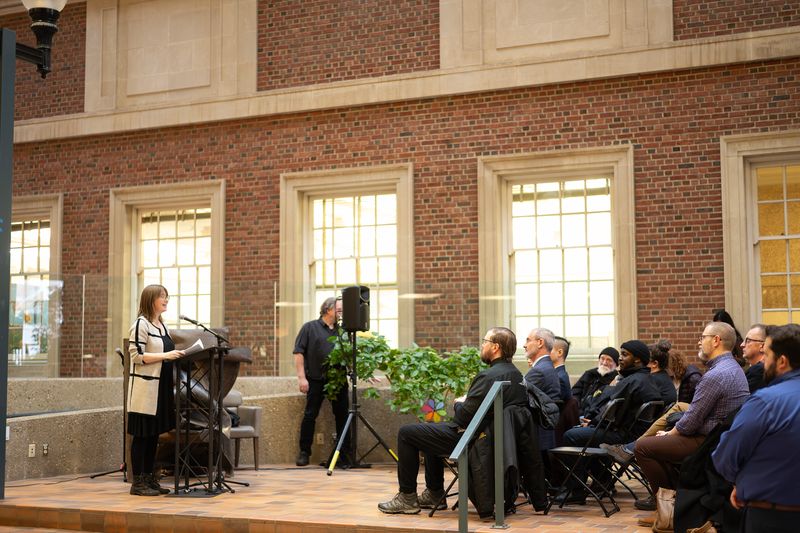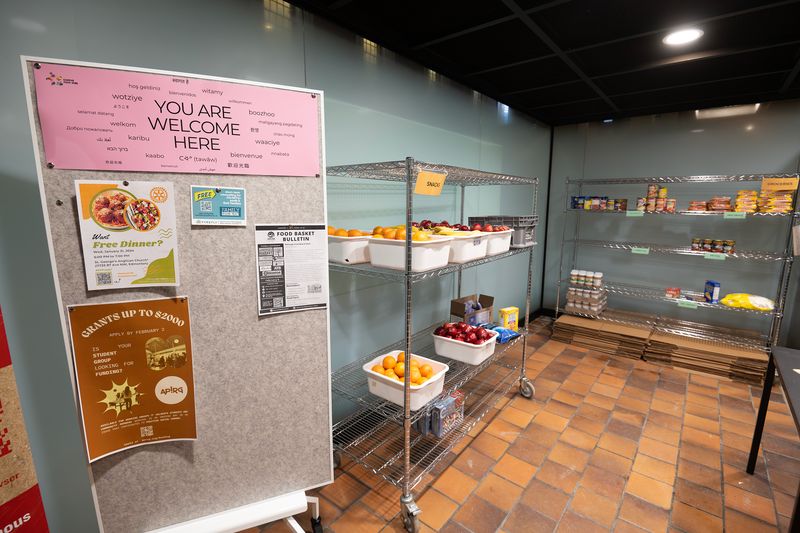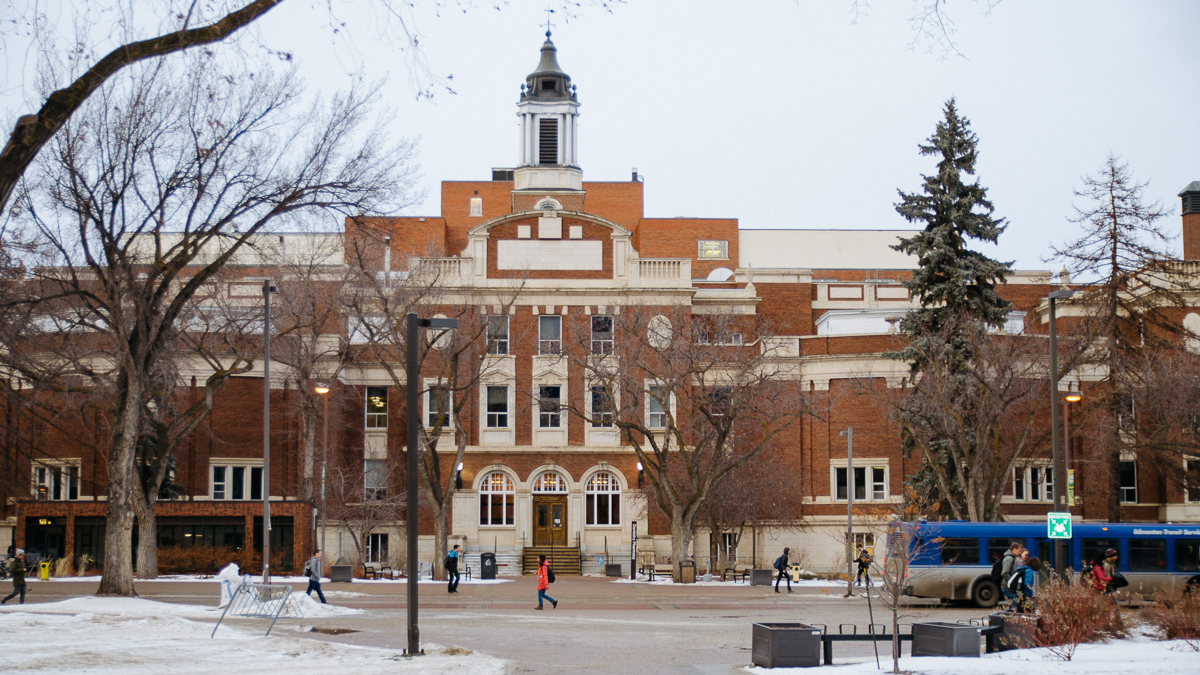Campus Food Bank launches new community pantry
Located in Rutherford Atrium, the pantry is a response to an "unprecedented spike in demand," CFB executive director says.
 Supplied
SuppliedOn January 22, the Campus Food Bank (CFB) hosted an official launch of the community pantry. Located in the Rutherford Atrium, the pantry is accessible by OneCard, and is open during Rutherford Library hours.
Erin O’Neil, CFB executive director, said the pantry will be a “convenient source of healthy, culturally varied, and nourishing food.” This pantry is the CFB’s response to the “unprecedented spike in demand” they have experienced in the last few years, she said.
To keep the pantry stocked, the CFB has created the Adopt a Week program. For one week, campus offices, student clubs, community organizations, and local businesses can volunteer to stock the pantry.
“We really wanted to think about the pantry as pivoting responsibility for food work on campus from one organization to the entire community,” O’Neil said.
As of January 22, the Office of the Dean of Students (DoS), department of biomedical engineering, the University of Alberta Senate, and the faculty of pharmacy and pharmaceutical sciences have all signed up to adopt a week.
O’Neil thanks those who helped get the pantry operational
O’Neil began her speech by discussing the recent encampment clearings performed by the Edmonton Police Service. These clearings have “displaced and traumatized our unhoused neighbours,” O’Neil said. As well, she acknowledged that much of Edmonton’s unhoused population identifies as Indigenous.
“At [the CFB] we believe that true food sovereignty on this land is only possible if stewardship is returned to the original caretakers of this territory. We say ‘land back.’”
Next, O’Neil said that after the past “difficult school year,” gathering to celebrate those who helped make the pantry possible and centering those experiencing food insecurity “feels like a gift.”
“By my account, more than 200 people helped us get to this,” O’Neil said.
Although the CFB will operate the pantry, they partnered with the U of A, DoS, Facilities and Operations, and U of A libraries.
“At CFB, we feel incredibly supported by this campus community. In the last few years of increased demand, we have never felt left alone or ignored by the people who surround us. Every day we get emails and phone calls from people looking to help. We are so fortunate to have neighbours like all of you. So, thank you very much.”
She also thanked the CFB’s more than 130 volunteers, who she called “superstars.”
“They don’t just show up, do their shift, and leave. CFB volunteers consistently give their valuable time to rock it past our expectations. They have helped us improve our programming, promote our services, ensure that clients feel heard, and even secure grants.”

“The financial pressures on our students are real. We need to do everything that we can as a university to address that,” Flanagan says
Following O’Neil, Bill Flanagan, U of A president and vice-chancellor, gave a speech. He began by thanking the CFB, their staff, and their volunteers.
“We know that many of our students are facing food insecurity. Our [CFB has] a tremendously important role in assisting our students with financial need.”
Flanagan said “that making food available to our students is not enough.” He said the university, the provincial government, the federal government, and the university’s donors have an important role in supporting students with financial instability.
In 2023, U of A students received over $82 million in financial support, Flanagan said. As well, 32 per cent of international students received financial support from the university, he said.
Flanagan said the university is pushing the provincial and federal governments to step forward to support students with financial needs.
“The financial pressures on our students are real. We need to do everything that we can as a university to address that.”
“Seeing the campus community step up and continue to support the CFB year after year is really impressive,” city councillor says
Michael Janz, Edmonton city councillor for Ward papastew, also spoke. His ward encompasses many of the neighbourhoods surrounding the U of A.
During his time as a student at the U of A, the CFB played an integral role in supporting students in need, Janz said.
Edmonton is “one big family,” Janz said. He added that currently, 49,000 households are in Core Housing Need.
“Which means if the rent keeps going up, they are the first ones to lose their home. So hunger, housing, all of these pieces [are] tied together,” Janz said. “If we don’t take collective action together than these problems are going to worsen.”
“Seeing the campus community step up and continue to support the CFB year after year is really impressive.”
Upcoming Student Experience Action Plan recognizes the need to address food insecurity,
Following Janz, Tim Tang, associate vice-president (student experience) and Ravina Sanghera, vice-provost and dean of students, spoke.
According to Tang, in the Student Experience Action Plan (SEAP), which will be announced on January 31, DoS recognizes the need to address concerns surrounding food poverty and food insecurity.
“We’ve heard from students that food insecurity can be very intimidating. It really can affect all aspects of the students’ experience at the U of A,” Tang said.
Sanghera said the challenge of accessing food is a reality for U of A students.
“But we are there to support our students, provide empathetic and inclusive support for these students, and uplift them together,” Sanghera said. “Student success is our success”

Assistant dean thinks community pantry will serve as “proof of concept”
In an interview with The Gateway, Kevin Friese, assistant dean (health and wellness), said DoS works closely with the CFB to support their endeavours. According to Friese, O’Neil brought the idea of the community pantry to the DoS as a potential way to address food insecurity on campus.
Friese said DoS recognized that the CFB has limited space and a set number of hours for access.
“There was certainly a drive to see a secondary location put on campus that would help to extend that capacity for the [CFB]. [As well as] extend the accessibility for students, faculty, and staff to be able to access that service when it’s most appropriate for them.”
DoS has seen “an increased need for supports that address food insecurity and student precarity,” Friese said. According to Friese, the DoS Student Care Coordinator team has seen an increase in cases related to financial hardship and food insecurity. As well, DoS is aware of the increasing demand for the CFB’s services.
“Those things taken together made it very easy for [DoS] to identify a need and to want to work with our partners to try to address that.”
Additionally, Friese sees establishing the community pantry as a way to demonstrate the value of community pantries and expand services.
“[I’m] also very hopeful that this serves as a proof of concept that allows us to look at [potentially] establishing other pantries within the university community,” Friese said. “Whether here on North Campus or in conjunction with Campus Saint-Jean or Augustana Campus.”




